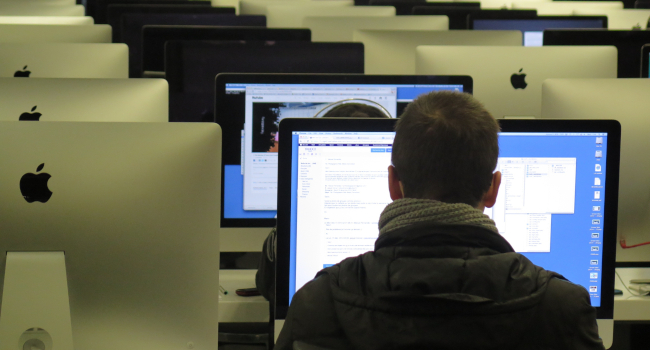Eye health tips for students from our Citrus Heights eye doctor
The start of fall means back-to-school for kids of all ages – and our team at EYEcenter Optometric wishes everyone a smooth and successful return to the classroom!
When your child enters school after a summer of outdoor fun, many of the summer’s vision hazards are left behind. Yet, that doesn’t mean all eye health risks are eliminated! Nowadays, the majority of learning is computer based – exposing students’ eyes to the pain and dangers of blue light and computer vision syndrome. Fortunately, a variety of helpful devices and smartphone apps are available to block blue light and keep your child’s vision safe and comfortable.
To help you safeguard your child’s vision for the upcoming semesters and the long term of life, our Citrus Heights optometrist explains all about computer vision syndrome and how to prevent it.
Symptoms of computer vision syndrome
It’s smart to familiarize yourself with the signs of computer vision syndrome. If your child complains about any of these common symptoms, you can help prevent any lasting vision damage by booking an eye exam with our Citrus Heights eye doctor near you:
- Eye irritation and redness
- Neck, shoulder and back pain
- Blurry vision
- Dry eyes, due to reduced blinking
- Headaches
Basics of blue light
Students spend endless hours in front of digital screens, be it a computer monitor, tablet, or smartphone. There is homework to be done, research to be conducted, texting with friends, and movies and gaming during downtime. All of this screen time exposes your child’s eyes to blue light.
Many research studies have demonstrated that flickering blue light – the shortest, highest-energy wavelength of visible light – can lead to tired eyes, headaches, and blurry vision. Additionally, blue light can disrupt the sleep/wake cycle, causing sleep deprivation and all the physical and mental health problems associated with it. As for your child’s future eye health, blue light may also be linked to the later development of macular degeneration and retinal damage.
How to avoid computer vision syndrome
Our Citrus Heights eye doctor shares the following ways to block blue light and protect against computer vision syndrome:
- Computer glasses, eyeglasses lenses treated with a blue-light blocking coating, and contact lenses with built-in blue light protection are all effective ways to optimize visual comfort when working in front of a screen. These optics reduce eye strain and prevent hazardous blue-light radiation from entering the eyes.
- Practice the 20-20-20 rule; pause every 20 minutes to gaze at an object that’s 20 feet away for 20 seconds. This simple behavior gives eyes a chance to rest from the intensity of the computer or smartphone screen, preventing eye fatigue.
- Prescription glasses can be helpful when using a computer for long periods – even for students who don’t generally need prescription eyewear. A weak prescription can take the stress off of your child’s eyes, decreasing fatigue and increasing their ability to concentrate. Our Citrus Heights optometrist will perform a personalized eye exam to determine the most suitable prescription.
- Moisturize vision with eye drops. One of the most common symptoms of computer vision syndrome is dry eyes, namely because people forget to blink frequently enough. Equip your child with a bottle of preservative-free artificial tears eye drops (available over the counter) and remind them to blink!
- Blue light filters can be installed on a computer, smartphone, and all digital screens to minimize exposure to blue. A range of helpful free apps are also available for download.
- Limit screen time for your child each day, or encourage breaks at least once an hour. Typically, the degree of discomfort from computer vision syndrome is in direct proportion with the amount of time your child spends viewing digital screens.
- Set the proper screen distance. Younger children (elementary school) should view their computer at a half-arm’s length away from their eyes, just below eye level. Kids in middle school and high school should sit about 20 – 28 inches from the screen, with the top of the screen at eye level.
For additional info, book a consultation and eye exam at EYEcenter Optometric
When you and your child meet with our Citrus Heights eye doctor, we’ll ask questions about your child’s school and study habits to provide customized recommendations on the most effective ways to stay safe from computer vision syndrome and blue light. Our optometrist stays up-to-date with the latest optic technologies and methods to prevent painful vision and eye health damage from using a computer, so you can depend on us for contemporary, progressive treatment.
At EYEcenter Optometric, we put your family's needs first. Talk to us about how we can help you maintain healthy vision. Call us today: 916-727-6518 or book an appointment online to see one of our Citrus Heights eye doctors.
Want to Learn More? Read on!
FOLLOW US:

